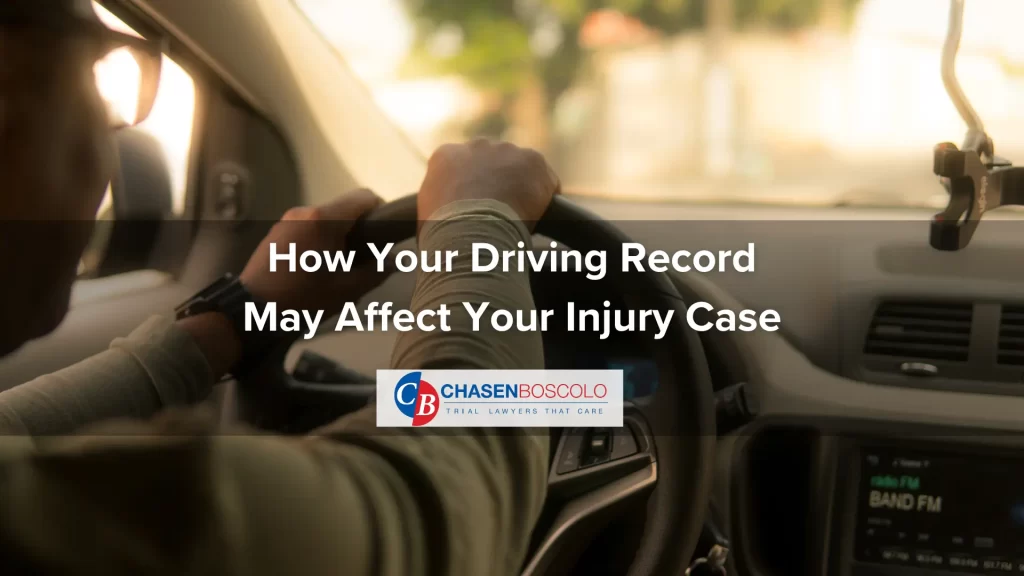Feb 20, 2023 | CHASENBOSCOLO

Insurance companies want to avoid paying claims. They often seek evidence to disprove the injury or reduce the claim’s value. That means the insurance adjuster handling your injury claim will likely search for reasons to deny your claim or offer a settlement much lower than you deserve.
Your driving record can negatively affect the outcome of your claim. Although someone else is at fault for the crash and should pay for your injuries and losses, the insurance carrier might view your driving history as proof that you might be liable for the crash. The adjuster can also argue that your injury might be a preexisting condition a previous accident caused.
You should hire an experienced car accident attorney from CHASENBOSCOLO immediately after a car wreck. Your legal team can help build a strong claim and pursue the compensation you deserve.
How Long Does a Car Accident Stay on Your Record?
In Virginia, points assessed on your driver’s license by the Department of Motor Vehicles (DMV) will remain on your record for two years. Typically, you receive these points if an officer issues a ticket for a traffic violation. Although a traffic violation conviction doesn’t typically require you to spend time in jail, you might get a ticket requiring you to pay a fine.
The type of traffic infraction determines the number of points placed on someone’s license:
- Three-point violations – A three-point violation might include violations like speeding one to nine miles per hour over the speed limit, improper passing, or failing to obey a highway sign.
- Four-point violations – A four-point violation involves violations such as speeding ten to nineteen miles per hour above the speed limit, passing when unsafe and following too closely.
- Six-point violations – A six-point violation can include traffic infractions such as reckless driving, driving under the influence, and driving on a suspended license.
A DMV record includes traffic citations, accidents, and other relevant details of your driving history. The court notifies the DMV of a driver’s traffic violation convictions.
The DMV has the choice to proceed with any of these actions:
- Issue an order of suspension to suspend your driver’s license
- Enter the traffic conviction on your record
- Notify the insurance carrier upon request
- Issue an order requiring a driver improvement clinic
- Assign demerit points based on the severity of the infraction
The dates the DMV removes demerit points from your license have nothing to do with your traffic record. The timeframes differ significantly. While points come off a license automatically after two years, traffic convictions stay on a person’s traffic record, depending on the severity of the offense.
For example, reckless driving leads to six demerit points. A conviction stays on the DMV record for eleven years. A three-point violation might involve improper passing, remaining on the DMV record for only three years.
Whenever you violate a traffic law and receive a ticket from law enforcement, the DMV can add more demerit points to your record. If you get too many, the department might suspend or revoke your driver’s license.
How Can I Get an Accident Off My Record?
You can’t remove an accident from your driving record without a mistake. However, you can accumulate safe driving points under specific circumstances.
You receive one point yearly if you carry a valid driver’s license and don’t commit a traffic violation or face license suspension. The maximum number of safe driving points allowed is five.
Completing a driver improvement clinic might also earn you five safe driving points. However, the court will determine if you should receive safe driving points if you must attend a driver improvement clinic to satisfy the requirements of a court order.
You can check for errors on your driving record by requesting a copy of your driving record transcript and paying a fee. The transcript includes up to eleven years of your driving history. You must notify the DMV of mistakes you find. If you don’t correct them, your record can affect your car insurance rates and lead to other issues.
 Fight for Fair Compensation After a Car Crash
Fight for Fair Compensation After a Car Crash
CHASENBOSCOLO has fought for injured clients since 1986. Our mission is to pursue the maximum compensation possible to get you on the road to recovery. You should not suffer the consequences of someone else’s misconduct. Our legal team will protect your rights and aggressively seek action against the person responsible for your injuries.
If you got hurt in a car accident due to someone else’s negligence, call CHASENBOSCOLO‘s Virgina car accident lawyers at (301) 220-0050 for a free consultation. We represent accident victims in Virginia, Maryland, and Washington, D.C.
Related Post

 Fight for Fair Compensation After a Car Crash
Fight for Fair Compensation After a Car Crash



